Hongbin Huang
Hi-Reco: High-Fidelity Real-Time Conversational Digital Humans
Nov 16, 2025Abstract:High-fidelity digital humans are increasingly used in interactive applications, yet achieving both visual realism and real-time responsiveness remains a major challenge. We present a high-fidelity, real-time conversational digital human system that seamlessly combines a visually realistic 3D avatar, persona-driven expressive speech synthesis, and knowledge-grounded dialogue generation. To support natural and timely interaction, we introduce an asynchronous execution pipeline that coordinates multi-modal components with minimal latency. The system supports advanced features such as wake word detection, emotionally expressive prosody, and highly accurate, context-aware response generation. It leverages novel retrieval-augmented methods, including history augmentation to maintain conversational flow and intent-based routing for efficient knowledge access. Together, these components form an integrated system that enables responsive and believable digital humans, suitable for immersive applications in communication, education, and entertainment.
EventSum: A Large-Scale Event-Centric Summarization Dataset for Chinese Multi-News Documents
Dec 16, 2024



Abstract:In real life, many dynamic events, such as major disasters and large-scale sports events, evolve continuously over time. Obtaining an overview of these events can help people quickly understand the situation and respond more effectively. This is challenging because the key information of the event is often scattered across multiple documents, involving complex event knowledge understanding and reasoning, which is under-explored in previous work. Therefore, we proposed the Event-Centric Multi-Document Summarization (ECS) task, which aims to generate concise and comprehensive summaries of a given event based on multiple related news documents. Based on this, we constructed the EventSum dataset, which was constructed using Baidu Baike entries and underwent extensive human annotation, to facilitate relevant research. It is the first large scale Chinese multi-document summarization dataset, containing 5,100 events and a total of 57,984 news documents, with an average of 11.4 input news documents and 13,471 characters per event. To ensure data quality and mitigate potential data leakage, we adopted a multi-stage annotation approach for manually labeling the test set. Given the complexity of event-related information, existing metrics struggle to comprehensively assess the quality of generated summaries. We designed specific metrics including Event Recall, Argument Recall, Causal Recall, and Temporal Recall along with corresponding calculation methods for evaluation. We conducted comprehensive experiments on EventSum to evaluate the performance of advanced long-context Large Language Models (LLMs) on this task. Our experimental results indicate that: 1) The event-centric multi-document summarization task remains challenging for existing long-context LLMs; 2) The recall metrics we designed are crucial for evaluating the comprehensiveness of the summary information.
Morphing median fin enhances untethered bionic robotic tuna's linear acceleration and turning maneuverability
Jul 26, 2024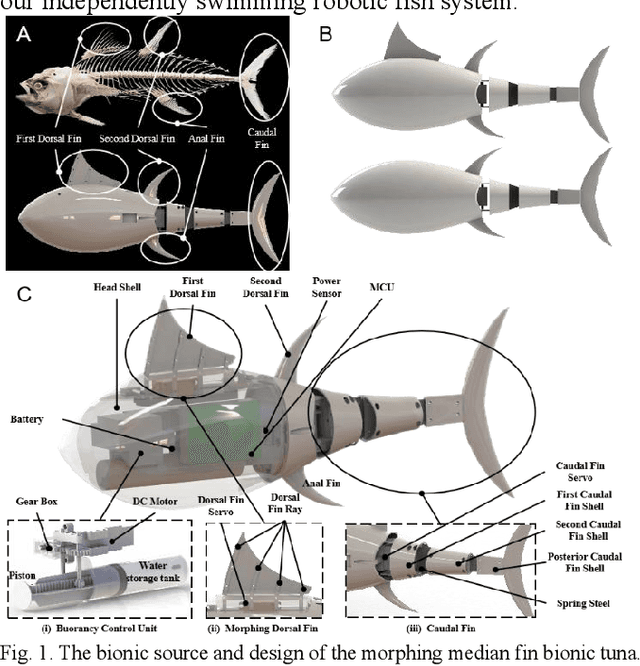
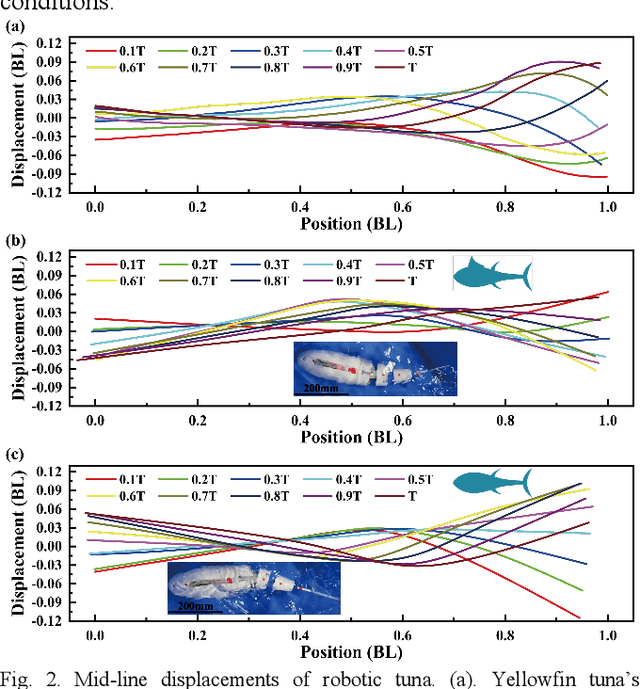
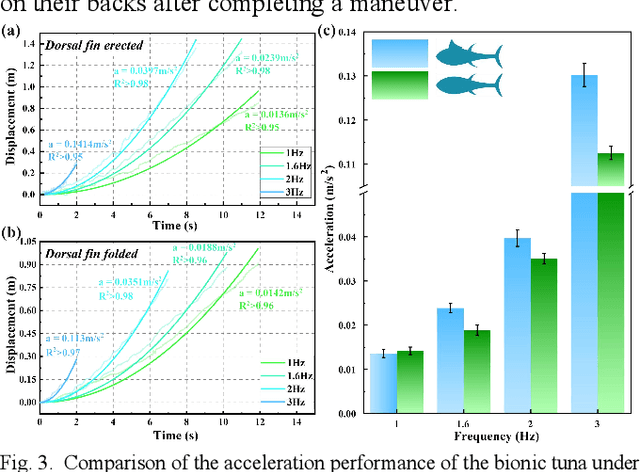
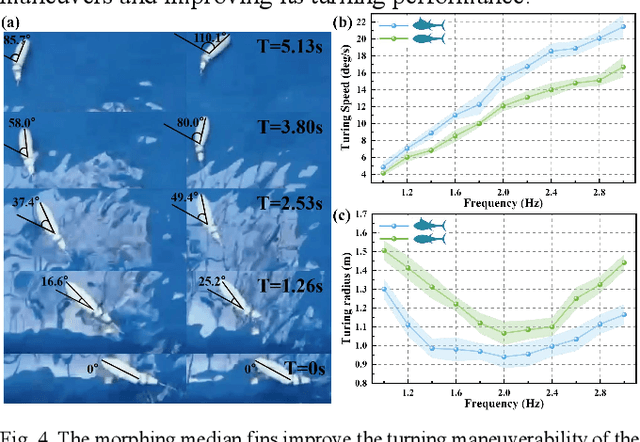
Abstract:Median fins of fish-like swimmers play a crucial role in linear acceleration and maneuvering processes. However, few research focused on untethered robotic fish experiments. Imitating the behaviour of real tuna, we developed a free-swimming bionic tuna with a foldable dorsal fin. The erection of dorsal fin, at proper conditions, can reduce head heave by 50%, enhance linear acceleration by 15.7%, increase turning angular velocity by 32.78%, and turning radius decreasing by 33.13%. Conversely, erecting the dorsal fin increases the wetted surface area, resulting in decreased maximum speed and efficiency during steady swimming phase. This finding partially explains why tuna erect their median fins during maneuvers or acceleration and fold them afterward to reduce drag. In addition, we verified that folding the median fins after acceleration does not significantly affect locomotion efficiency. This study supports the application of morphing median fins in undulating underwater robots and helps to further understand the impact of median fins on fish locomotion.
CMNEE: A Large-Scale Document-Level Event Extraction Dataset based on Open-Source Chinese Military News
Apr 18, 2024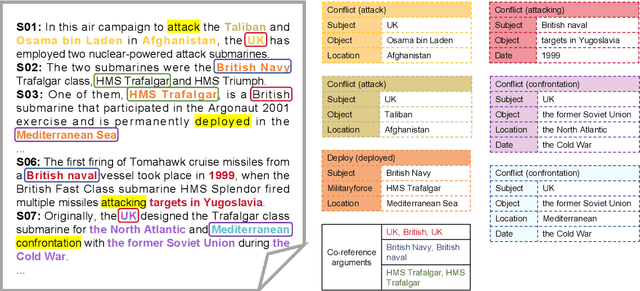
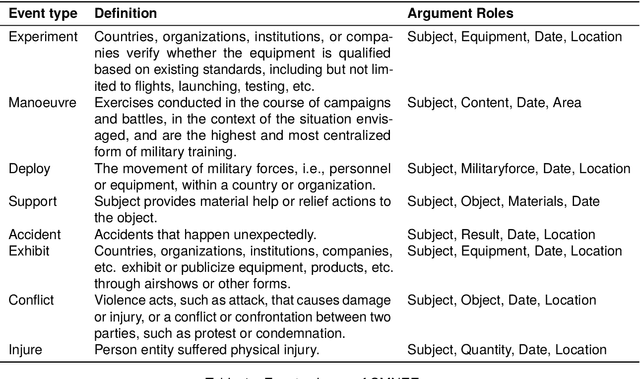


Abstract:Extracting structured event knowledge, including event triggers and corresponding arguments, from military texts is fundamental to many applications, such as intelligence analysis and decision assistance. However, event extraction in the military field faces the data scarcity problem, which impedes the research of event extraction models in this domain. To alleviate this problem, we propose CMNEE, a large-scale, document-level open-source Chinese Military News Event Extraction dataset. It contains 17,000 documents and 29,223 events, which are all manually annotated based on a pre-defined schema for the military domain including 8 event types and 11 argument role types. We designed a two-stage, multi-turns annotation strategy to ensure the quality of CMNEE and reproduced several state-of-the-art event extraction models with a systematic evaluation. The experimental results on CMNEE fall shorter than those on other domain datasets obviously, which demonstrates that event extraction for military domain poses unique challenges and requires further research efforts. Our code and data can be obtained from https://github.com/Mzzzhu/CMNEE.
 Add to Chrome
Add to Chrome Add to Firefox
Add to Firefox Add to Edge
Add to Edge